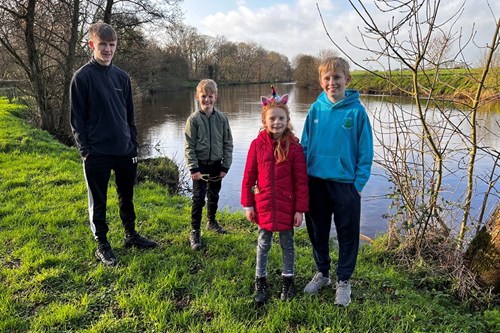Being big brothers to a deaf sister
Published Date: 19 May 2022
Sam (14), Matthew (12) and Oliver (10) are all hearing boys and big brothers to Charlotte (aged 8 with bilateral profound sensorineural deafness, who wears cochlear implants). I often wonder how it feels for them being brothers to Charlotte and if her being deaf makes any difference to them.
All the boys behave protectively towards Charlotte – she is, after all, the only girl and the youngest child, who also happens to be deaf. I wondered how much her deafness played into this.
We often have conversations about acceptance and bullying in our house, thankfully just for education and awareness purposes so far (I am hoping we are lucky enough it stays that way), and often the examples involve, “Imagine if someone was making fun of your sister for being deaf – how would that make you feel?” Needless to say, none of the boys were comfortable with that. As a family, we are big into promoting equal and accessible opportunities and making sure we encourage the kids to always accept everyone because difference is what makes the world so interesting and amazing.
As a family, we have all learnt sign language to various degrees via the National Deaf Children's Society’s ‘Family Sign’ and ‘Sign at Home’ programmes, amongst other opportunities. However, Charlotte rarely uses sign, preferring instead to speak. Almost in contrast to this, she expects us to be able to fluently sign when she is not wearing her ‘magic ears’ so that she is always fully included in the conversation (she doesn’t wear her implants in the mornings, during bath/swimming and overnight). At times, the boys were very engaged with signing or found the classes a chore – typical children when asked to learn outside of a school setting. I felt they sometimes resented having to learn to sign and would sometimes admit to this saying that Charlotte doesn’t sign anyway, so what’s the point.
When asked about Charlotte’s deafness, Sam, the eldest, simply said that it’s a bit different but it doesn’t really affect him much. He feels that Charlotte just gets on with it and it doesn’t seem to matter to her.
Matthew and Charlotte are the most similar in personality within our family. They often pair off together for games, TV and when out and about. When asked about having a deaf sister, Matthew thought it was cool because it makes her different. He wants to be able to know how it feels to be deaf and is looking forward to when Charlotte can explain that to him. Matthew commented on Charlotte’s sense of bravery and adventure, stating that she would try anything whether she had her ears on or not – climbing, canoeing or pier-jumping. Finally, he talked about how she loves to tell stories and that she adds extra details about sensory information that other people don’t, such as explanations about the smells and sounds.
Oliver considered his response carefully, he commented on how he needed to make sure Charlotte was listening to him before he started talking and also how he often needs to explain things differently to her. When asked for an example, he talked about how she often found it difficult to understand jokes because they involved abstract concepts, which she finds difficult to understand, and he would need to explain the story around the joke to help her.
Each of the boys has a beautiful relationship with their sister, and we don’t notice any difficulties in bonding or any communication barriers. They have all taught fingerspelling and a few simple signed phrases to their friends in school. They are proactive in making sure there are subtitles on TV and explaining to people what their sister’s implants are when people stare or ask about them. Although, they all comment on how loud she is when she’s not wearing her implants, especially if she hurts herself!
When the kids were younger and Charlotte had a lot of appointments and a lot of our time seemed to be focussed on her, we did need to make sure we made individual mum/dad time with each of the kids, making it obvious to them that we wanted to spend time with all of our children equally. Now the appointments have eased and there isn’t such a focus on Charlotte’s deafness, sign language classes or learning about new technology, which gives us more family time for activities we all enjoy such as sports, forest walks, and exploring and kayaking at the beach.
I’m glad the boys have accepted that deafness is just a part of their sister and don’t see it as a problem or hurdle. I love that they always communicate with her whether she is wearing her technology or not and that they are not bothered about people asking them questions. I did feel pressure as a mum during those early days of frequent and lengthy appointments, but by ensuring we planned in time with the boys, we made sure none of our relationships suffered and that we all continued to have fun, family time.
